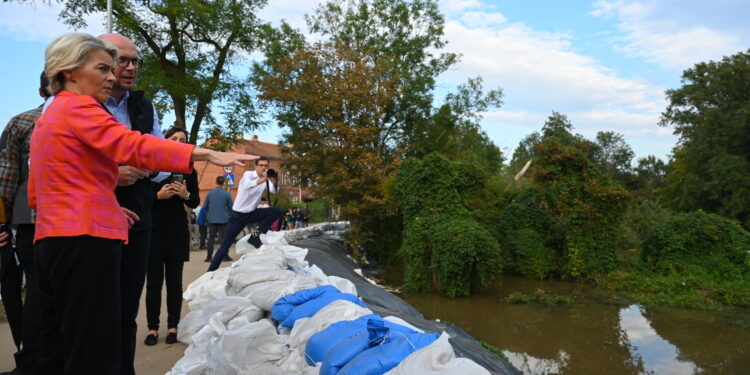Brussels – The devastating floods in Central and Eastern Europe are forcing themselves onto the European Union’s agenda. After holding, on Wednesday morning, a debate on the issue with the European Commissioner for Crisis Management, Janez Lenarcic – the plenary of the European Parliament on Thursday (Sept. 19) approved by a show of hands a resolution on flooding in Austria, the Czech Republic, Germany, Hungary, Poland, Romania, and Slovakia calling for more funds for prevention and disaster response capacity. Late Thursday afternoon, European Commission president Ursula von der Leyen, on her way to Kyiv, stopped in Poland, where she met with the country’s prime minister, Donald Tusk, the Austrian chancellor, Karl Nehammer, the Czech prime minister, Petr Fiala, and Slovak premier Robert Fico, and announced the possibility of 10 billion euros, available from Cohesion Funds, for reconstruction.
The text approved by MEPs expresses “dissatisfaction with recent budget cuts to the EU Civil Protection Mechanism” and calls for “sufficient and upgraded funding to increase preparedness and improve capacity building, with a particular view to the next multi-annual EU budget.” In addition, MEPs want the EU Solidarity Fund to be “commensurate to the increasing number and severity of natural disasters in Europe” and urge the Commission to “accelerate the mobilization of funding to affected countries.” Parliament calls for “other technical and financial support, such as cohesion policy instruments, to be made available.” In the long term, the resolution calls for “more EU investment in regional and local resilience” as well as for “future EU Cohesion Policy to focus even more on climate change mitigation and adaptation.” In this context, the MEPs said they want the Commission to quickly present a European Climate Change Adaptation Plan, highlighting the need for urgent investment in flood management and prevention measures.
From Strasbourg to Poland. At a press point with prime ministers, von der Leyen was quick to give reassurances about the EU’s closeness to the affected populations. “This is a very important moment. I am here to reassure you that Europe stands by your side. Faced with natural disasters, we all have to stand together. It was for me, on one hand, heartbreaking to see the destruction and the devastation through the floods. But I must also say, it was, on the other hand, heart-warming to see the enormous solidarity between the people in your countries, the countless volunteers tirelessly helping day and night to overcome this disaster. Europe is by your side,” von der Leyen said.
She then addressed the issue of resources on the ground. “Of course, the most pressing question is: Can we help with funding to repair and reconstruct? We have two sources. It is very important that we mobilize whatever is possible. On one hand, there is the Solidarity Fund, which we can use to rebuild infrastructure to rebuild infrastructure, like roads, highways, railways, and bridges, for example,” von der Leyen explained. “But I think this will not be sufficient when we see the enormous size of the disaster. So we have discussed that we will take a bold step forward with cohesion funds. You need maximum flexibility, and you need speed. And therefore, we will mobilize cohesion funds in a flexible and targeted way, where you need them most — for what you need, for specifics, and damaged places – and, secondly, for pre-financing,” she continued. “Third, normally cohesion fund goes with co-financing from the Member States. Here, we can do 100% European money – no co-financing. These are extraordinary times and extraordinary times need extraordinary measures. At first sight, EUR 10 billion could be mobilized from the cohesion funds,” she concluded.
English version by the Translation Service of Withub

![Ursula von der Leyen. La presidente uscente della Commissione europea cerca l'inizio del secondo mandato con il voto del Parlamento europeo alla squadra di commissari [foto: European Commission]](https://www.eunews.it/wp-content/uploads/2024/11/vld-2411-350x250.jpg)









